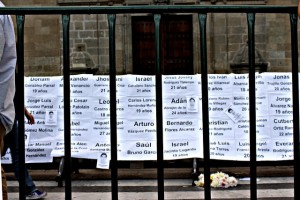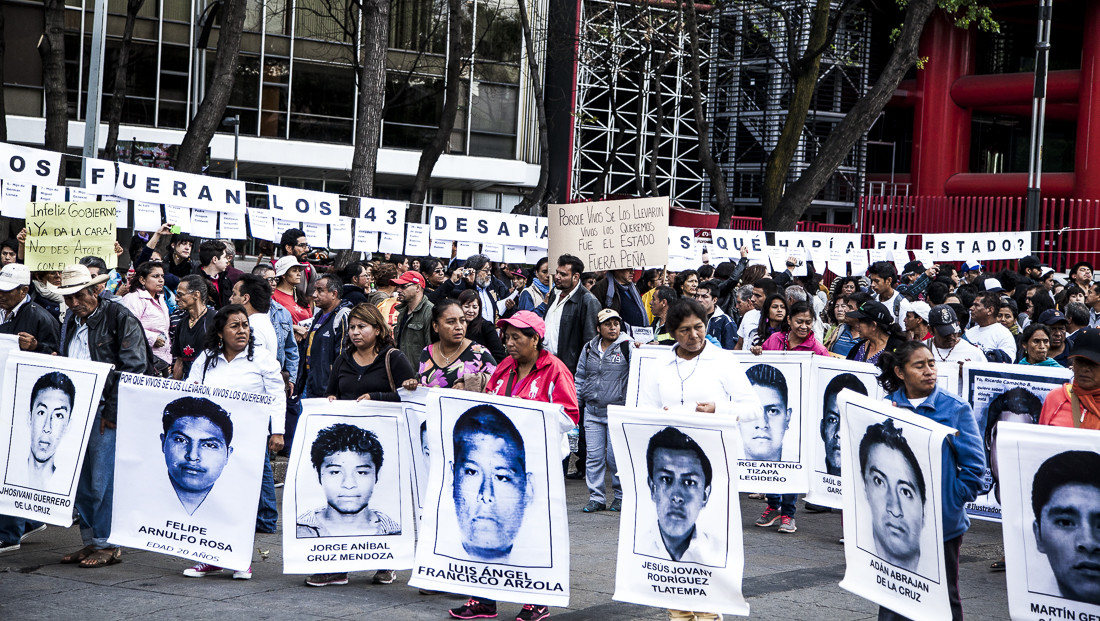It has been three weeks since the disappearance of the 43 Mexican students from Ayotzinapa, Guerrero. Starting with demonstrations on October 8th, civil society groups and the international community have demanded to know the whereabouts of the students and have clamored for justice against the perpetrators. The search has prompted more questions, but in the midst of this confusion one thing remains clear: This incident is but the latest – and most brutal – evidence of the social and political decomposition that has been taking place in the country. The events in Ayotzinapa have questioned the so-called “Mexican moment” of prosperity, exposing the deep corruption and entrenched collusion between the drug cartels and the Mexican State.
Violence in Mexico is not rare. The war against the drug cartels, declared by former President Felipe Calderón in 2006, has resulted in a traumatic readjustment of Mexican society. What started as a war between the national army and the drug cartels has mutated into a complex, multifaceted conflict, involving rival cartels, local governments, federal institutions, self-defense groups and political actors, among others. This has led to the normalization of violence: Human rights violations are commonplace and range from kidnappings, extortions, sexual abuses, killings en masse, threats and the disappearance of civilians. As of 2012, the death toll reached between 60,000 and 120,000 deaths, based on estimations by official and international organizations respectively.
The tremendous increase in violence has eroded governmental legitimacy on a national level, and dampers international economic investment, tourism and foreign relations. In an attempt to remedy the situation, Mexican President Enrique Peña Nieto has been pushing for numerous reforms that aim to promote economic development and reintegrate Mexico to the global market. Primarily targeting the fiscal, telecommunications and energy sectors, the reforms aim to present Mexico as a hub for innovation and development. This is what his administration has called the “Mexican moment”: A series of campaigns that seek to restore the government’s legitimacy, and to shift the narrative from a potential failed state scenario to a rising nation. Indeed, within a few months of his 2012 election, Peña Nieto was Saving Mexico in Time Magazine, and reports about Mexico started shifting from the decaying national stability to the rapid improvements in the economy.
The illusion of the “Mexican moment” fell apart with the events of Ayotzinapa. On September 26th, local policemen in the city of Iguala opened fire against 80 students from the rural teacher training college in Ayotzinapa, who had been raising funds in order to attend a peaceful demonstration in Mexico City. During this event, 6 students were murdered and 57 were forcefully taken away in police cars. A few days later, 14 of them managed to escape, and declared that the remaining students were turned in by the police to the local drug trafficking group known as the “United Warriors.” On October 4th, with the whereabouts of the 43 students still unknown, a mass grave was found in the nearby area, with at least 28 charred bodies inside. As citizens of Guerrero, the most violent state of Mexico, fellow teacher-trainees assumed that the identities of the corpses belonged to the missing students.Investigations continued to reveal chilling information about police involvement in the incident. After interrogations, 22 policemen confessed to collusion with the United Warriors. Mayor of Iguala Jose Luis Abarca has taken flight with his wife, Maria de los Ángeles Pineda, who was later discovered to be the sister of one of the main leaders of the United Warriors. Despite the magnitude of the events, the mayor of Guerrero has assumed no responsibility.
While violent episodes occur on a daily basis in Mexico, the events of Ayotzinapa have sparked national outrage, and attracted significant international attention. Not only was this an act of violence committed against civilians; these were students training to be teachers in rural areas, young activists committed to improving the plights of Mexican civilians. Not only was this an act linked to the drug war violence; it was committed in collusion with the authorities themselves, those who are responsible for protecting civilians. It is vital to recognize this tragedy for what it is: a state crime.
As Mexican social activist and political leader Imanol Ordorika Sacristán emphasizes, it is important to acknowledge the involvement of the Mexican State in the events of Ayotzinapa. In this incident, state authorities used force against civilians through the criminalization of protest, as well as the forceful abduction and murder of individuals, in order to induce terror and collective paralysis. Moreover, the authorities have not been held accountable. There is jarring lack of transparency in the treatment and punishment of these acts, and this conduct has come to characterize the behavior of these institutions.
Ironically, the effort from authorities to stop students from exercising their right to protest has spurred massive civil action. Starting on October 8th, demonstrations in Mexico and around the world have been organized to show solidarity and demand information about the students’ whereabouts. Valeria Hamel, an undergraduate student who has been largely involved in the #Yosoy132 student movement in Mexico since 2012, points out that even though there was a slow initial reaction from the government, the large civil response and media spotlight has pressured leaders to act.The director of Amnesty International Mexico, Perseo Quiroz, has urged President Peña Nieto and his administration to conduct immediate and transparent investigations on the terrible abuses taking place in Mexico. In a country where the torture rate increased by 600 percent in the last ten years, Amnesty International rightfully indicates that the prevalence of impunity from government authorities will only contribute to the decaying conditions in Mexico.
The actions from the international community have not been limited to recommendations provided by non-governmental organizations. The European Union has labeled the case of Ayotzinapa as a matter of urgent discussion. Furthermore, the EU has already suspended the process of extending the 2008 “Global Agreement” with Mexico, stating that before such economic affairs can be discussed, the Mexican government must first ensure human rights are upheld in their country.
Herein lies Peña Nieto’s greatest fear: The events in Ayotzinapa might cause the image of the “Mexican Moment” to crumble. His administration’s aim to bolster Mexico’s reputation in the international arena and downplay the costs of the drug war have lost all force. From his perspective, the disappearance of the students, along with the civil response it has stimulated, has reminded the general public of the reputation that Mexico had during the previous administration: A corrupt state that cannot break from the grips of the drug war. Since Ayotzinapa has already weighed on foreign economic ties, will the illusion of the “Mexican moment” continue?

The reality is that the “Mexican Moment” never arrived. No matter how many reforms are passed by the Congress, or how many media campaigns insist on the emergence of a renewed Mexico, the “Mexican Moment” cannot take place as long as the country is wracked by violence. The drug war is far from over, and its ensuing violence is a systemic problem. The exposure of the collusion between the Mexican State and drug cartels has evidenced that the situation has reached a critical stage – the police department and local governments are prey to drug cartel interests. Thus, as long as the State remains an unaccountable, corrupt and active participant in acts of violence, there will be no place for economic development.
The active presence of the civil society in the past month has pressed the government to address the underlying causes of this tragedy. As a result, police forces are increasing the standards for “trust exams” required to join the ranks to prevent cooperation with the cartels. Achieving stability in Mexico is indeed possible, but it will require a comprehensive revision of the state’s institutions in order to ensure that they serve the interests of the Mexican population rather than the cartels. The discovery of six more mass graves in the past days shows that this reform needs to start immediately.
The road towards a real “Mexican Moment” is long, and unfortunately the current situation looks grim. Disturbing as it is, the students of Ayotzinapa were raising funds to attend the commemoration of the Mexican student massacre in 1968. It is unacceptable that these types of human rights violations persist in the country, and that they are conducted with complete impunity. This is cycle that we, as Mexicans, need to break. Let us hope the events of Ayotzinapa serve as an ultimatum for drastic change to begin.
